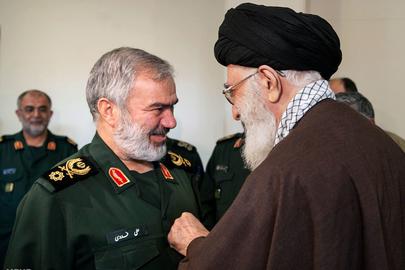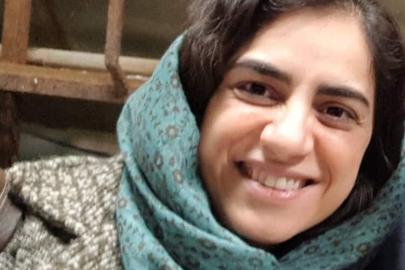Iranian Supreme Leader Ayatollah Ali Khamenei has made two new appointments to the command of the Islamic Revolutionary Guard Corps (IRGC) amidst growing tensions between the Islamic Republic and the United States.
In what appears to be an attempt to create a “division of labor” among the Guards’ leadership, Khamenei announced the changes on May 16. He appointed Rear Admiral Ali Fadavi to be the second-in-command of the Revolutionary Guards to assist General Hossein Salami, its commander-in-chief, and Brigadier General Mohammad Reza Naghdi as Deputy Coordinator.
As with Hossein Salami, who the Leader appointed as the top commander of the IRGC in April, Ali Fadavi is known for making threats against the United States in recent years. As speculations about the prospects of possible naval clashes between Iran and the US continue, Fadavi is of particular interest to the international community because he is the former commander of the Revolutionary Guards’ Navy.
It was during Fadavi’s command when, in January 2016, Iran captured 10 US Navy sailors in the Persian Gulf — a move that resulted in Fadavi receiving official praise and military decoration from Ayatollah Khamenei. The IRGC’s Navy conducted extensive maneuvers under his command, including one in which a replica of a US battleship was destroyed.
Like Salami, Ali Fadavi belongs to the third generation of IRGC commanders, although during the 1980-1988 war with Iraq, Fadavi was more involved in conducting the war than Salami was, operating as a mid-level commander.
Fadavi was born in 1961 in Ardestan in Isfahan province and worked for the Islamic Republic of Iran Broadcasting (IRIB) for a time soon after the 1979 Islamic Revolution. Like several other Guards’ commanders from Isfahan, he entered the war as an irregular fighter before he was recruited by the Guards as an officer and was then promoted to mid-level commander at an IRGC base.
For years Fadavi served as the commander of Sector 1 of the Guards’ Navy and as the commander of the Iranian Navy’s Intelligence Bureau. In May 2010, he was appointed as the commander-in-chief of the IRGC Navy and immediately moved its headquarters from Tehran to Bandar Abbas on the Persian Gulf.
Although he seldom talks about domestic politics, he has been a sharp critic of Iranian government officials and their performance — in particular members of the nuclear negotiating team. Appearing on TV, he said that in their negotiations with western countries, Iranian diplomats had failed to praise Iran’s military achievements and use them for leverage. Fadavi quoted the Supreme Leader when he said: “Take them and show them the country’s military might.” He said that afterward he invited Iranian diplomats to visit military sites but that they ignored his invitation.
In a speech, he criticized the project to expand sea tourism on Kish Island in the Persian Gulf, dismissing it as a public relations exercise for politicians: “All officials including Mr. Akhoundi [Abbas Ahmad Akhoundi, the Minister of Roads and Urban Development from 2013 to 2018] supported this project, got on the boats and took photographs with them but now we can see how this project has failed miserably and its investors have been ruined.” In retaliation, Akhoundi replied: “One of our skills as Iranians is not to recognize our place and talk out of place.”
No War but More Hawkish
The appointment of Ali Fadavi as IRGC’s second-in-command signals that Khamenei wants to make the Guards more battle-ready and, at the same time, emphasize its reputation for being anti-American. Although Ayatollah Khamenei said on May 14 that neither Iran nor the US wants a war, he is trying to make the Revolutionary Guards appear more powerful in the current tense atmosphere. Hence the appointment of Fadavi.
Fadavi was appointed Deputy Coordinator of the IRGC in the summer of 2018, a job that has now been entrusted to Mohammad Reza Naghdi. The Deputy Coordinator post was created in 2007, and the coordinator is responsible for the Guards’ “personnel’s affairs, military training, political and ideological education, publications and publicity, intelligence, planning and operations and engineering.” Naghdi’s reputation has always been more political than military and, with his appointment, he will practically be in charge of the political activities of the Revolutionary Guards.
With the two new appointments, Ayatollah Khamenei is sending a message to both Iranians and the outside world: the Revolutionary Guards Corps is going to be more hawkish both inside and outside Iran. And, to achieve this hawkish stand, Hossein Salami and Ali Fadavi will manage the military aspects and confrontation with the United States, while the job of confronting political forces inside the country is now entrusted to Mohammad Reza Naghdi.
Related Coverage:
Hossein Hamedani: Suppressor of Protests in Iran and Syria, May 9, 2019
Ali Fazli: Suppressor of Urban Riots, May 2, 2019
Hassan Tehrani Moghaddam: The Myths Behind the Father of Iran’s Missile Program, April 26, 2019
Yahya Rahim Safavi: Khamenei's First Appointment, April 24, 2014
New Guards Commander: More Missiles and a More Hawkish Approach, April 23, 2019
Generational Change as Leader Appoints New Revolutionary Guards Commander-in-Chief, April 23, 2019
How Will Listing the Guards as a Terrorist Organization Change Iran?, April 19, 2019
Mohsen Rezaei: Loser of War, Economics, and Politics, April 19, 2019
Mohammad Ali Jafari: From Architect to Chief Commander, April 15, 2019
The Bagheri Brothers: One in Operations, One in Intelligence, April 12, 2019
Ghasem Soleimani: The Mythical Commander, April 11, 2019
visit the accountability section
In this section of Iran Wire, you can contact the officials and launch your campaign for various problems



























comments